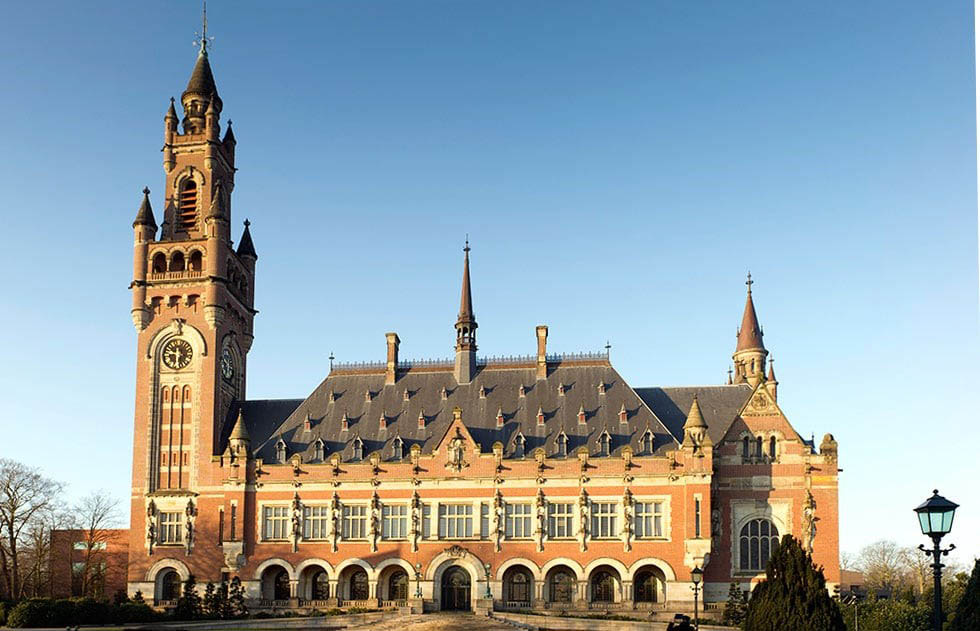The International Court of Justice (ICJ) is to rule on Thursday on a preliminary objection by Venezuela in relation to the approach by Guyana for the upholding of the validity of the 1899 Arbitral Award settling the boundaries of the two countries.
A release from the ICJ, also known as the World Court said: “On Thursday 6 April 2023, the International Court of Justice, the principal judicial organ of the United Nations, will deliver its Judgment on the preliminary objection raised by the Bolivarian Republic of Venezuela in the case concerning the Arbitral Award of 3 October 1899 (Guyana v. Venezuela).
“A public sitting will take place at 3 p.m. at the Peace Palace in The Hague, during which Judge Joan E. Donoghue, President of the Court, will read out the Court’s decision”.
In March 2018, Guyana filed its application with the ICJ to confirm the validity and binding effect of the Arbitral Award of 1899 on the boundary between the two countries and the subsequent 1905 agreement, following the decision by the UN Secretary-General Antonio Guterres to choose the ICJ as the next means of resolving the controversy which stems from Venezuela’s contention that the award was null and void.
In its Application of March 29, 2018 before the ICJ, Guyana requested that the Court adjudge and declare that:
“(a) The 1899 Award is valid and binding upon Guyana and Venezuela, and the boundary established by that Award and the 1905 Agreement is valid and binding upon Guyana and Venezuela;
(b) Guyana enjoys full sovereignty over the territory between the Essequibo River and the boundary established by the 1899 Award and the 1905 Agreement, and Venezuela enjoys full sovereignty over the territory west of that boundary; Guyana and Venezuela are under an obligation to fully respect each other’s sovereignty and territorial integrity in accordance with the boundary established by the 1899 Award and the 1905 Agreement;
(c) Venezuela shall immediately withdraw from and cease its occupation of the eastern half of the Island of Ankoko, and each and every other territory which is recognized as Guyana’s sovereign territory in accordance with the 1899 Award and 1905 Agreement;
(d) Venezuela shall refrain from threatening or using force against any person and/or company licensed by Guyana or engage in economic or commercial activity in Guyanese territory as determined by the 1899 Award and 1905 Agreement, or in any maritime areas appurtenant to such territory over which Guyana has sovereignty or exercises sovereign rights, and shall not interfere with any Guyanese or Guyanese-authorised activities in those areas;
(e) Venezuela is internationally responsible for violations of Guyana’s sovereignty and sovereign rights, and for all injuries suffered by Guyana as a consequence.”
Guyana’s recourse to the ICJ came after decades of stalemate in its border controversy with Venezuela. While Venezuela had said it was not participating in the process, it was a part of the case management process. Its Vice President Delcy Rodríguez had told the ICJ that her country’s participation was “as a courtesy, not as a party in this procedure.”
On 7 June 2022, however, Caracas joined the proceedings when it raised preliminary objections to the admissibility of the case before the Court. Hearings on this matter were heard by the ICJ in November last year. Lawyers presented arguments for Guyana and Venezuela over several days.
In a release yesterday on the upcoming decision, Guyana’s Ministry of Foreign Affairs and International Co-operation noted that Venezuela filed preliminary objections to the admissibility of Guyana’s Application to the Court and in the oral hearings which were conducted from 17 to 22 November 2022, it contended that the United Kingdom is an indispensable third party to the case, which should not be allowed to proceed in its absence. The Ministry said that Guyana argued that the United Kingdom is not indispensable because it has no legal interests that would be affected by a judgment on the validity of the Arbitral Award of 3 October 1899, which fixed the boundary between British Guiana and Venezuela, or any interests in the boundary itself, such interests having terminated in May of 1966, upon Guyana’s independence.
It said that the reading of the Judgment will be broadcast live on the Court’s website and on UN Web TV.
Guyana will be represented at the reading of the Court’s decision by:
• Carl Greenidge, Agent of Guyana in the case concerning the Arbitral Award of 3 October 1899;
• Anil Nandlall, S.C, M.P, Attorney General and Minister of Legal Affairs;
• Ambassador Elisabeth Harper, Co-Agent and Permanent Secretary of the Ministry of Foreign Affairs & International Cooperation;
• Paul S. Reichler, Lead Counsel, Attorney-at-Law, Foley Hoag LLP, member of the Bars of the United States Supreme Court and the District of Columbia;
• Professor Philippe Sands KC, Professor of International Law at University College London, 11 King’s Bench Walk, London; and
• Professor Pierre d’Argent, Professor ordinaire, Université Catholique de Louvain, member of the Institut de Droit International, Foley Hoag LLP, member of the Bar of Brussels.






